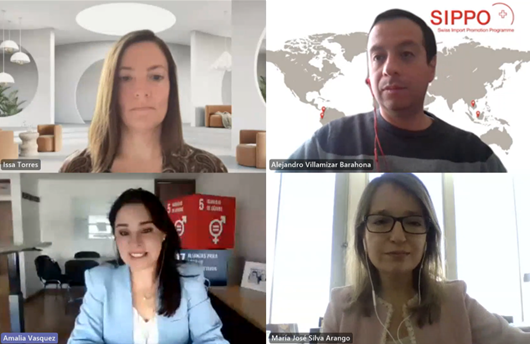How to measure the impact of tourism to make it more sustainable?
With the attendance of more than 70 representatives from the Ministry of Commerce, Industry and Tourism, ProColombia and ACOTUR, was held the virtual workshop on the creation of indicators and measurement of sustainable tourism in Colombia.

On May 25, the Swiss Import Promotion Program - SIPPO Colombia; held the workshop "Strengthening capacities for the creation of indicators and measurement of sustainable tourism in Colombia", with the aim of supporting the BSOs in strengthening their measurement capacities, to develop a tourism that generates income in communities and territories, preserving the integrity of natural and cultural resources for the future.
During the development of the workshop, the consultant Issa Torres presented the references and good practices around the new ways of measuring tourism, highlighting the Guide of the World Tourism Organization (UNWTO), of Indicators of Sustainable Development for Tourist Destinations, which contains around 600 indicators of tourism sustainability in criteria such as well-being of the host communities, conservation of cultural heritage, community participation in tourism, tourist satisfaction, protection of the natural values of the destination, management of natural resources, planning and control of the place of destination, among others. Reference was also made to the UNWTO International Network of Sustainable Tourism Observatories (INSTO), created in 2024, with the main objective of supporting the continuous improvement of sustainability and resilience in the tourism sector through systematic, timely and regulate the performance and impact of tourism.
The consultancy also developed other benchmarks for tourism measurement such as the European Sustainable Tourism Indicator System (ETIS) and the criteria for Tourism Sustainability in the travel and tourism industry of the Global Sustainable Tourism Council (GSTC). Likewise, reference was made to the cases developed in the Dominican Republic and Costa Rica.
During the development of the seminar, the participants expressed the need for a constant articulation between all the entities of the sector, which allows the creation of indicators that are really useful for decision-making and serve for the implementation of the sustainable tourism policy.
Among the most important challenges mentioned by the participants, the need to have a budget assigned exclusively for measurement, constant political support and adequate methodological guidance for the establishment of a battery of indicators and a monitoring and evaluation system, which truly contributes to the strengthening of sustainable tourism in Colombia.
From SIPPO, the importance of improving tourism indicators was highlighted, in such a way that they can have figures that account for the impacts that this activity generates for destinations and communities, and that these data allows formulating strategies to attract quality tourism.
As a result of this workshop, it was recommended to work closely with the private sector and local authorities in the destinations, think carefully about which indicators are really useful for the country vision and be aware that the creation and monitoring of tourism indicators sustainable is a long-term initiative.
You can watch the workshop on the SIPPO Colombia YouTube channel: https://www.youtube.com/watch?v=mo9s2-WQLZg



 North Macedonia
North Macedonia











